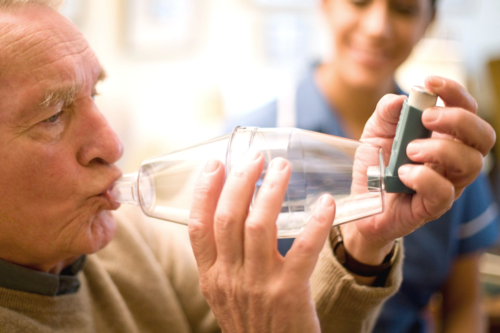On World Asthma Day (5 May), the European Respiratory Society (ERS) urges people with asthma to continue using their prescribed medications, including inhaled corticosteroids, to control asthma symptoms and reduce the risk of experiencing severe COVID-19 complications.
Prof. Arzu Yorgancioglu is an asthma expert and incoming Chair of the ERS Advocacy Council. She said: “For people who have respiratory conditions such as asthma, the COVID-19 outbreak is understandably a very big cause for concern. We know that COVID-19 attacks the lungs and can trigger asthma symptoms like wheezing, chest tightness and difficulty breathing, which is very distressing for patients and can cause feelings of anxiety.
“On World Asthma Day, it is more important than ever to reach out and reassure people that having a lung condition does not make them more likely to catch the virus, and to reiterate the importance of continuing to use asthma medications as prescribed, as this can help to protect people from serious symptoms if they do become ill with COVID-19.”
Current evidence on COVID-19 and asthma does not suggest that people with asthma are more likely to catch SARS-Cov-2, which is the virus that causes COVID-19, but hospital data shows that respiratory patients are more likely to experience severe complications due to COVID-19 infection. As there is still no cure for COVID-19, the best action that people can take to protect themselves from infection is to:
- Use asthma medications as instructed by your healthcare provider.
- Stock up on supplies such as food, medications and other household essentials.
- Keep away from others who are sick, both when inside and outside, and ask anyone who has symptoms not to visit.
- Wash hands regularly with soap and warm water or using an alcohol-based hand sanitizer.
- Quit smoking.
Use of inhaled corticosteroids effectively prevents asthma symptoms, and there is some evidence to suggest that inhaled corticosteroid use is associated with reduced expression of ACE-2.
Prof. Guy Joos is a member of the ERS Advocacy Council with expertise in asthma. He explained: “ACE-2 is a type of molecule that sits on the surface of lung cells. It has been identified as the ‘entry point’ that allows SARS-CoV-2 to get into the cells of the lungs and cause an infection. Early evidence suggests that use of inhaled corticosteroids is linked to reduced expression of this molecule; in theory this could contribute to protecting against COVID-19, but more research is needed to confirm this.”
The European Respiratory Society recommends health professionals to ensure that all asthma patients have a written asthma action plan in line with GINA’s interim guidance on asthma management during the COVID-19 pandemic, and urges health workers to take steps to minimise their own risk of infection, including by:
- Minimising face-to-face contact; where possible, telephone screening should be conducted before in-person appointments, to check whether patients have COVID-19 symptoms.
- Advising against the use of nebulizers due to the risk of transmitting SARS-CoV-2 to other patients and to healthcare workers.
- Avoiding spirometry in patients with confirmed or suspected COVID-19.
Prof. Thierry Troosters, President of the ERS, said: “The COVID-19 outbreak is a challenging time for all us in the respiratory health sector and especially our patients, but we hope that on World Asthma Day, people with asthma feel supported and reassured that there are simple actions that they can take to continue protecting their health.”
The European Respiratory Society is streaming a live webinar from 18:00 CEST on World Asthma Day focusing on the potential impact of COVID-19 on asthma patients. The webinar will be led by airways disease experts and features asthma patient advocates from the European Lung Foundation’s (ELF) patient network. Register for the webinar for free.
More asthma resources for World Asthma Day
- Selected articles from ERS publications
- E-learning materials
- ELF patient materials: adult and childhood asthma





